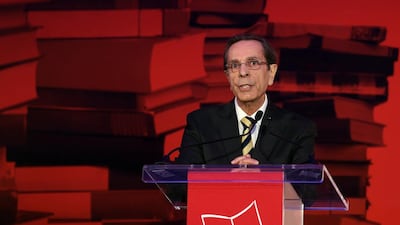There is no separating Palestine from Rabai Al Madhoun.
The 70-year-old novelist, an editor for London's Asharq Al Awsat newspaper, says the plight of his homeland remains his reason for writing.
"It is impossible for me to put Palestine aside when I write," he says, minutes after his third novel, Destinies: Concerto of the Holocaust and the Nakba, was announced as the winner of the 2016 International Prize for Arabic Fiction.
It was chosen from 159 novels by authors spanning 18 countries in the Arab world.
“This win is not only for me,” says the British citizen. “This win is for my country, for a Palestine that rejoices with me, for the city of Haifa that will hold a festival of joy following this honour.”
Written in four parts, with each presenting protagonists likened to the instruments of an orchestra, Destinies grapples with the issue of identity.
Plucked from Al Madhoun’s own life experience – he left his birthplace in Ashkelon and spent time in Egypt, Lebanon and Cyprus before settling in London, the quest for identity is the central theme of Destinies.
“This novel tackles issues related to living in exile and those related to existence or living under Israeli rule,” he says. “It also tackles the Palestinian dream of ‘return’ and the possibilities of obtaining residency in Israel. The story might give an idea of what our future as Palestinians might be. I leave it up to the reader to decide. I leave it open-ended because, as Palestinians, our issue remains unresolved.”
Al Madhoun spoke to The National ahead of his panel session today at New York University Abu Dhabi, where he will discuss his novel and prize.
Congratulations on winning the IPAF prize. How is the feeling?
I haven’t slept in 24 hours. Every time I try, my phone beeps with yet another message, yet another Facebook notification, telling me, ‘Yalla, we want to rejoice, Palestinians want to rejoice’. I stayed up thinking to myself, what shall I do if I don’t win with all these Palestinians waiting to celebrate with me? So thank God, I won. I had to, for all those waiting. So come on now, Palestine. You can rejoice.
What prompted the journey of Destinies?
As a Palestinian novelist, I was born and raised during the 'catastrophe' that spanned the period since before 1948 until now. Consequently, I never lived a normal life in my homeland, and I moved between a number of Arab countries. I have been, as a result, hugely concerned with the Palestinian cause. Destinies is a novel that tackles the Palestinian exodus and follows the lives of those who live in exile, as well as those who stayed and became citizens under the rule of Israel. In general, the main theme of the novel is 'the diaspora'. And I wanted to pay tribute to the Arabs of Israel, the Arabs of 1948, who have been ignored for 40 years. They are the ones who have held the country up, the ones who stayed behind.
Who did you have in mind when writing the novel?
The Palestinian reader. Of course, it is for all readers, Palestinians and Arabs and everyone who does me honour by reading it – but through exploring who I am as a Palestinian Arab, I reach out to every Palestinian. I personally believe that the Palestinians in exile [today] will not be able to visit these places they dream of in Palestine – to live in Jerusalem or visit. Maybe in 50 or 60 years, perhaps, but not today. So I wanted to take them to these cities. I wanted to present these cities, honour them, as I did with my own birthplace, Al Majdal in Ashkelon. When I returned there after 67 years away – I left when I was 3 years old – when I arrived and got out of the car, it felt like I had lost my balance, like my very memory had become unbalanced. My mind raced. Where was my father, where did he get married, which alleys did he walk through? Where did I take my first steps, where did I play? It was a shock for me, and I had to stand aside as I cried and allowed my wife to search for my childhood in those streets. I wanted to show this picture to my readers who ache to return, through the stories of Destinies. I think of it as novelistic or narrative tourism."
What’s next?
I am 70 years old and I just want to be free to write in the years I have left. I feel my main goal has come true, after making the 2010 IPAF shortlist for The Lady of Tel Aviv, where I gave a panorama of the last few months of life in Gaza under occupation, then succeeding with my ambition to cover the remaining part of the Palestinian story with Destinies. This novel has been my life for four years.
Rabai Al Madhoun will appear today in a panel discussion about the International Prize for Arabic Fiction at 1pm, NYU Abu Dhabi, Saadiyat Island. For details email kutub@bbc.co.uk
artslife@thenational.ae

